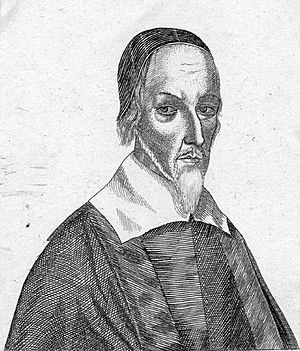Praise-God Barebone facts for kids
Quick facts for kids
Praise-God Barebone/Barbon
|
|
|---|---|
 |
|
| Member of Parliament in Barebone's Parliament | |
| Personal details | |
| Born | c. 1598 |
| Died | 1679 |
| Profession | Preacher, leather-seller |
Praise-God Barebone (c. 1598–1679) was an English leather-seller and preacher. He was also a member of a religious group called the Fifth Monarchists. He is most famous because a special Parliament in 1653 was named after him: Barebone's Parliament. This happened during the time of the Commonwealth of England, when England was a republic without a king.
Contents
Early Life and Family
We don't know much about Praise-God Barebone's early years. Some historians think he might have been the son of a rector (a church leader) named John Barebone. He might have also had an older brother named Fear-God.
What we do know is that he became a skilled leather-seller in 1623. He had worked as an apprentice for about eight or nine years to learn the trade. He later became a leader in the leather-sellers' group. In 1630, he married his wife, Sarah. They had at least one son, Nicholas Barbon, who grew up to be a well-known economist.
There's a bit of confusion about a very long name, 'Unless-Jesus-Christ-Had-Died-For-Thee-Thou-Hadst-Been-Damned'. Some people thought this was Praise-God's own name, while others said it was his brother's or even his son Nicholas's name.
His Religious Beliefs
By 1632, Barebone had joined a church group that was a bit separate from the main Church of England. By 1641, he started giving sermons (religious speeches) at his shop in Fleet Street in London. On December 19, 1641, one of his sermons caused trouble. He spoke against bishops and the Book of Common Prayer, which was the official prayer book. This made some young apprentices angry, and they broke the windows of his shop.
Some people from his church group were arrested and sent to prison. Others managed to escape by climbing over rooftops! The crowd outside destroyed his shop sign.
Barebone later disagreed with some people who believed in adult baptism by immersion (being fully dipped in water). He wrote a book to explain his views on baptism. He also had arguments with local church leaders. Later, he joined the Fifth Monarchists, a group who believed that Jesus Christ would soon return to Earth to rule for 1,000 years.
Joining Parliament
In July 1653, Praise-God Barebone was chosen to be a representative for the City of London. He joined a new governing body called the Nominated Assembly. This group was set up by Oliver Cromwell and the Army Council after they removed the previous Parliament.
The members of this Assembly were chosen, not elected by the public. Many people didn't like this new Assembly, and they started calling it Barebone's Parliament. They picked on Barebone because of his unusual name and his humble background as a leather-seller.
Even though he wasn't one of the main leaders, Barebone was very active in the Assembly. He worked on committees that looked at things like church taxes (called tithes) and making changes to the law. He also helped calm down a large group of women who were protesting in support of a man named John Lilburne.
Later Years
Barebone continued to be involved in London's local government from 1657 to 1660. In 1660, he tried to stop the return of the king to England. This event is known as the English Restoration. He helped publish a book that shared bad stories about the future king, Charles II. He also joined other citizens in asking Parliament to prevent the king from returning.
When the king did return, people celebrated by lighting bonfires. But young apprentices broke all the front windows of Barebone's house because they didn't like his views. In July 1660, after the king was back, a royalist paper reprinted a petition Barebone had made. This petition had asked Parliament to refuse rule by Charles II.
Because of his strong views, Barebone was arrested on November 25, 1661. He was charged with treason and sent to the Tower of London. He was freed on July 27, 1662, after his wife asked for his release because he was ill. In 1666, his shop was one of the many buildings destroyed in the Great Fire of London.
Praise-God Barebone passed away at the end of 1679 and was buried on January 5, 1680.
His Writings
Praise-God Barebone wrote several books and pamphlets:
- A Discourse tending to prove ... Baptism ... to be the ordinance of Jesus Christ. (1642): In this book, he explained his beliefs about baptism.
- A Reply to the Frivolous and Impertinent answer of R.B. and E.B. to the Discourse of P.B. (1643): This was a response to others who disagreed with his ideas.
- Good Things to Come (1675): In this work, Barebone wrote about his belief that Jesus Christ would soon return to Earth to rule.
Family
His oldest son was Nicholas Barbon, who became a famous economist.
 | Delilah Pierce |
 | Gordon Parks |
 | Augusta Savage |
 | Charles Ethan Porter |

